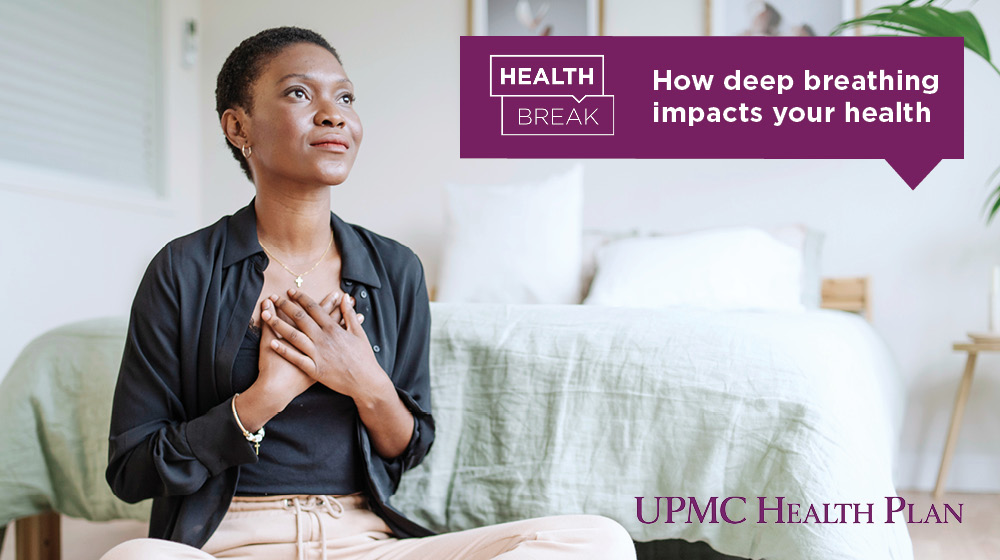Health Break: How deep breathing impacts your health

A podcast for UPMC Health Plan members, Health Break is your quick guide to caring for your mental and physical health, prioritizing wellness, and making the most of your health insurance plan.
Episode 3: Take a Health Break with PA Takes a Breath
In this Health Break, we revisit PA Takes a Breath, a UPMC Health Plan virtual event that shows the benefits of deep breathing. Hear from Dr. Matthew Hurford and practice a simple breathing exercise with UPMC Health Plan health coaches.
Episode transcript:
Camille: Welcome to Health Break by UPMC Health Plan, your quick guide to health, wellness, and how to make the most of your health insurance plan. Listen during your coffee break, lunch break, or anytime you need a break. I’m your host, Dr. Camille Clarke-Smith. I help to oversee the quality of the plans we offer at UPMC Health Plan.
Alex: And I’m your co-host, Alex Treanor. I’m a senior health coach who works with our members on healthy lifestyle habits and goals. This is your… Health Break.
Camille: Hey! This is Dr. Camille Clarke-Smith. Today we’re revisiting PA Takes a Breath, a UPMC Health Plan virtual event featuring Dr. Matthew Hurford and UPMC Health Plan health coaches Cassie, Carla, and Barrett.
Together we’ll practice a deep breathing exercise that you can do anywhere, anytime—and learn more about what deep breathing can do for your health.
Dr. Hurford: Hello, and welcome to PA Takes a Breath! On behalf of all of us at UPMC Health Plan, I want to thank you for being here. You may be surprised by what just a few deep breaths can do!
My name is Dr. Matthew Hurford, and I’ll be your host today. For the next five minutes, I encourage you to really focus on this moment and this exercise. Cassie will get us started by describing how to create a calm environment.
Cassie: Thanks, Dr. Hurford. To prepare for our exercise today, and for anytime you want to take a few moments for deep breathing, start first by finding a quiet location. Remove distractions by closing the door, turning off your TV or music, and quieting any notifications or alerts.
Next, choose a comfortable seated position, either on the floor, a cushion, or a chair. Close your eyes if that feels right to you or soften your gaze by looking downward. Ground yourself in this location, feeling the floor beneath you. Rest your palms on your legs if that feels natural or leave them at your side. Allow your face and jaw to relax. Your teeth should separate a little while your lips stay together. Drop your shoulders and let your back “melt” into the floor or chair.
You’re all set. Feel free to readjust as you need to throughout this practice today. Carla will now lead us through our deep breathing exercise.
Carla: Thank you, Cassie, and welcome everyone. Today we are going to be doing an exercise for deep breathing called diaphragmatic breathing, also known as belly breathing.
Take some time to relax your shoulders and start by taking an inhale through your nose for 1, 2, 3, 4, 5, and pause at the top of your inhale. Exhale for 5, 4, 3, 2, 1. Pause.
And begin again. Breathe in for 1, 2, 3, 4, 5, and pause. Exhale, relax your jaw, for 5, 4, 3, 2, 1. Pause.
That’s great. Let’s do it again. Breathe in for 1, 2, 3, 4, 5. Pause here. Relax your shoulders for 5, 4, 3, 2, and 1.
That’s all—Barrett will tell you know about how deep breathing can benefit your health.
Barrett: Thank you, Carla, and great job everyone. Now that was a quick and simple, yet powerful deep breathing activity. But you may be wondering, what exactly can deep breathing do for me, and how does it work?
Well, stress, anxiety, and depression can appear as both physical and mental difficulties. The good news is that deep breathing can help you deal with both. For example, your body’s stress response, better known as “fight or flight,” can increase or elevate your blood pressure. Over time, this may increase your risk for heart disease, or it may suppress your immune system, making you more susceptible to colds and other illnesses.
Also, unmanaged stress can reduce your ability to think clearly, and it can reduce your ability to control your impulses, which leads to poor decision-making. Deep breathing triggers your body’s relaxation response, enabling you to stay poised even in difficult situations, come up with the best solutions, protect and cultivate your relationships, and increase your overall productivity.
Now how does it work? Deep breathing increases the overall amount of oxygen in your blood. Once your brain detects this increase in oxygen, it will signal the body to decrease the amount of stress hormones in the blood. This creates a calming effect, which enables you to realign both your physical and mental state, even in times of discomfort.
Regular daily practice of deep breathing can positively shift your overall health and well-being. The bottom line: Deep breathing is like hitting the reset button for your mind and your body. Back to you, Dr. Hurford.
Dr. Hurford: Thank you, Barrett. And thank you to everyone who participated today! When it comes to mental and behavioral health resources, we’ve got you covered.
You can find activities like today’s exercise by visiting the UPMC MyHealth Matters blog or following us on social media. Our tools include the RxWell mobile app, which combines proven, self-guided techniques with the help of a health coach. Our health coaches like Cassie, Carla, and Barrett can support you outside of the app, too. We offer counseling sessions through LifeSolutions, which can take place over the phone or virtually through UPMC AnywhereCare.
Thanks again, PA, for taking five minutes for your mental health today. Have a great week.
Camille: We hope you’ve enjoyed this replay of PA Takes a Breath. Visit the show notes for this episode to learn more about the programs that are available to you based on your coverage type. Find show notes and more information at upmchealthplan.com/podcast. Join us as we explore other health and wellness topics in the next episode of Health Break. This podcast is for informational and educational purposes. It is not medical care or advice. Individuals in need of medical care should consult their personal care provider. Views and opinions expressed by the hosts and guests are solely their own and do not necessarily reflect those of UPMC Health Plan and its employees.
Related to this episode:
- Get connected to tools and programs to support your mental health based on your coverage type.
- Download RxWell.
About Dr. Matthew Hurford:

Dr. Hurford is the president and chief executive officer (CEO) of Community Care Behavioral Health Organization, the nation’s largest not-for-profit behavioral health managed care organization. Dr. Hurford has worked in public-sector psychiatry for nearly 20 years holding various leadership positions in academic, government and managed care systems. Dr. Hurford is a board-certified psychiatrist who has provided care to people with serious mental illness and substance-use disorder in diverse settings including the Indian Health Service on the White Mountain Apache Reservation in Arizona and urban community mental health centers in Philadelphia. He earned a bachelor’s degree in political science from Swarthmore College, a medical degree from the Temple University School of Medicine, and he completed his residency and chief residency in psychiatry at the Hospital of the University of Pennsylvania.
About Cassie Smolic:

Cassie has been with the UPMC Health Plan for almost five years, first as a lifestyle health coach and now a clinical engagement coordinator for the Clinical Education Team. Her educational background is a Bachelor of Science in Education from Slippery Rock University and a bachelor’s and master’s in Nutrition from Indiana University of Pennsylvania. Cassie is very passionate about teaching clinical staff new skill sets to positively impact members at UPMC Health Plan. She also enjoys being able to help others develop healthy lifestyle behaviors, specifically incorporating good nutrition and physical activity practices to achieve weight loss as a diabetes prevention program (DPP) coach in the UPMC DPP. In her free time, Cassie teaches indoor spin classes a few times a week.
About Carla Higgins:

Carla is a lifelong learner of balanced wellness. She graduated from Penn State University in Nutrition Sciences and went onto Ruby Memorial Hospital’s dietetic internship to become a registered dietitian. In 2019 she graduated with a Masters degree in Adult Education from Point Park University. Her career highlights include being the corporate dietitian of Heinz North America, Communication Chair and Web Editor for the SCAN (Sports, Cardiovascular and Wellness Nutrition) DPP, product development of major brands such as GNC and Nestle NA and Board member and 2013 Chair of the PA Dietetic Association meeting and now owning her own yoga and barre studio. At UPMC Health Plan, Carla is a health coach and enjoys the variety of members that she speaks with and offering them the chance to engage in their own health and wellness.
About Barrett Hammons:

Barrett is a master’s level, board-certified senior health coach who believes that everyone has the potential to become the master of their well-being. As a U.S. Army combat veteran, Barrett knows what it takes to turn misery into mastery. He takes great pride in showing UPMC Health Plan members how to use their personal challenges as fuel for their growth. Driven by his passion for service and grounded in more than a decade of coaching experience, Barrett has won a reputation for being a lifestyle health coach par excellence.
About Dr. Camille Clarke-Smith:

Camille Clarke-Smith, EdD, is a program director in the Quality Improvement, Medicare Stars Department at UPMC Health Plan, where she leads the Medicare Faith and Wellness Program, a 3- to 12-week health and wellness challenge. She is also the founder of the nonprofit Transforming the Health of African American Women (THAW) Inc. She earned a doctorate in health and physical activity education from the University of Pittsburgh in addition to a master’s in exercise science and a bachelor’s in psychology and sociology. She is currently pursuing her master’s degree in social work at Carlow University.
About Alex Treanor:

Alex Treanor is a lead health coach at UPMC Health Plan. As a lifestyle health coach, she specializes in helping you lose weight, eat healthy, get more physical activity, be less stressed, and quit tobacco. Alex has a master’s in Kinesiology, Integrative Wellness from Point Loma Nazarene University. She has been coaching since 2014 and is a Nationally Board Certified Health & Wellness Coach and Certified Personal Trainer. Alex is passionate about helping people improve their relationship with food and exercise while creating healthy, sustainable routines filled with enjoyment. Alex enjoys spending time with her husband, walking with her dog, and eating tacos in the sunshine.
*UPMC Health Plan does not charge for text messages. However, data and message rates from your carrier may apply. To stop receiving healthy tips, text STOP to 478-762 at any time.



